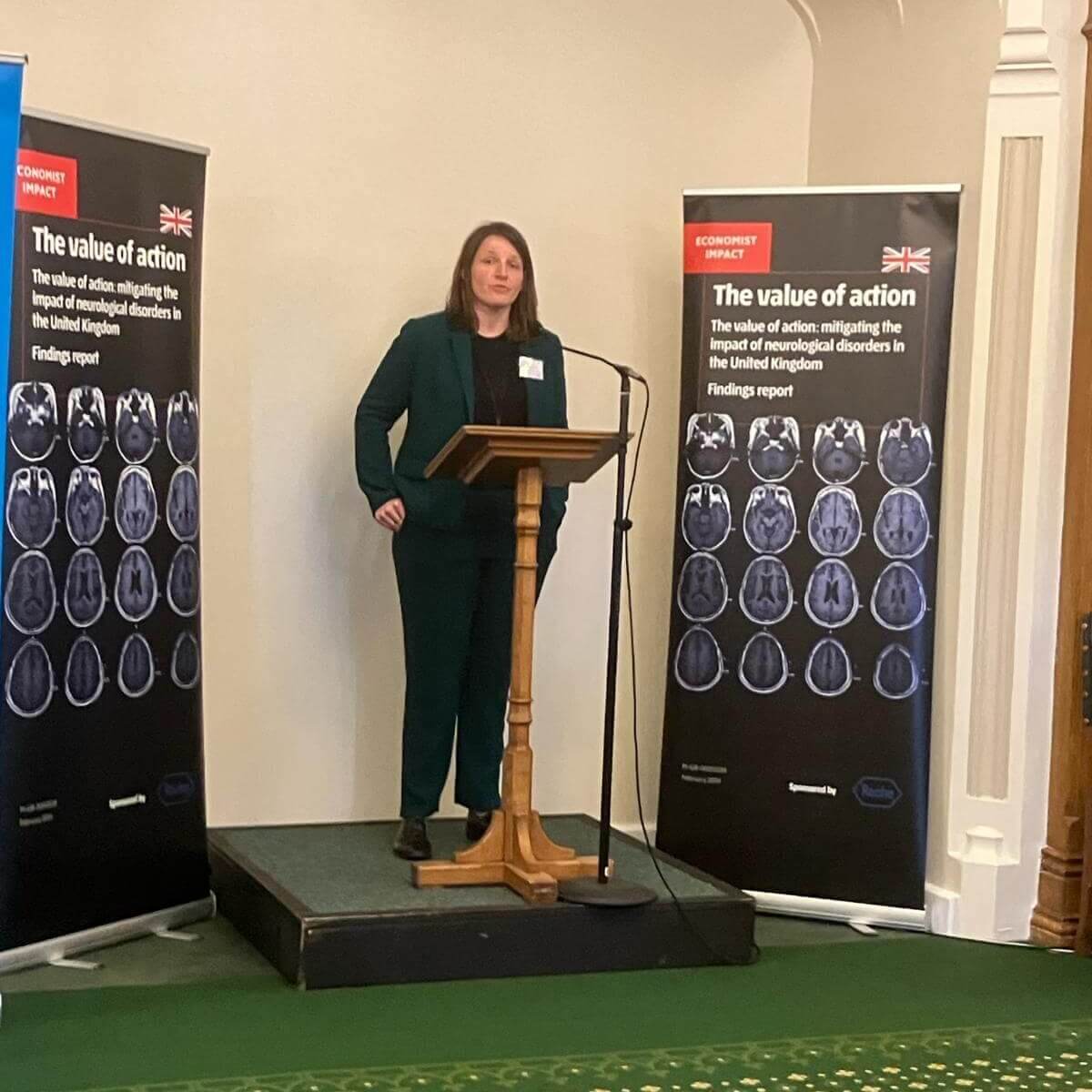Too costly to wait: provide care and support now and reduce the economic impact of neurological conditions
27/02/2024
Blog by Georgina Carr, Chief Executive of The Neurological Alliance.

This week new research from the Economist Unit, sponsored by Roche, found that neurological conditions cost at least £96 billion annually – and that these costs could be reduced by more than £30 billion, if care was improved, and existing options for treatment and care were implemented consistently across the UK.
I spoke at the parliamentary launch of the report, The value of action: mitigating the impact of neurological disorders in the United Kingdom, this week. The Neurological Alliance is continuing to call on the Government to establish a Neuro Taskforce without delay.
As Chief Executive of the Alliance, I believe that implementing the Neuro Taskforce has the potential to have a massive impact on people affected by neurological conditions as it will set out a framework showing how to provide care that meets people’s needs, makes efficient use of resources and addresses economic challenges.
Here is what I spoke about.
Hear a radio interview about the report:
Meet Sarah and Mohammad
Sarah (not her real name) was diagnosed with Parkinson’s a few years ago after experiencing problems with her sleep and a slight tremor. In her words, she was “passed from pillar to post for two years in search of a diagnosis”. She told us that she hadn’t been able to access physiotherapy when she needed to. She believes that has cost her her ability to walk.
Mohammad (not his real name), lives with his wife and two children. His son lives with a rare form of epilepsy. Mohammad’s son now lives with PTSD due to his seizures, and has just turned 16. Mohammad told us that his son has now been passed from paedatric to adult neurology services, but as he isn’t 18, they won’t accept him. That means his son, together with his father and family, is left with no one to help.
These experiences, which are based on stories shared with the Alliance, are similar for thousands of people across the UK.
12,000 people waiting more than a year for answers
1 in 6 people in this country live with a neurological condition. In fact, it is highly likely, that everyone in the UK knows someone with a neurological condition or has one themselves.
Here at the Neurological Alliance, we bring together organisations to work together to bring about much needed improvements to treatment and support for everyone affected by a neurological condition.
Over 90 organisations working together to address common challenges
Our member organisations support hundreds of thousands of people affected by neurological conditions every year, and invest millions into research. There is so much in common in terms of the challenges we face and the changes that are needed for everyone living with a neurological condition – there is a common need to, improve access to healthcare professionals who have knowledge and understanding of neurological conditions and how they can affect life, improve access to comprehensive support right now and drive research into better support and treatments in future.
It is in all of our interests to make sure that when something goes wrong with our nervous system (neurological conditions can affect not only the brain, but the spinal cord and nerves too: our whole nervous system), that we can access the right treatment and support in a timely way. The report is yet another reminder of the importance of that, not just for an individual, but for society too.
Yet for too many people, they do not access the right support when they need it most.
Cutting waiting lists improves lives
Parliamentarians often talk of the need to cut waiting lists. Let’s consider this from the perspective of neurology and neuroscience . More than 12,000 people throughout England have been waiting for more than a year to be seen by an NHS neurologist or neurosurgeon.
In our most recent patient experience survey, one in five people told us they had to wait more than a year from being referred by their GP to seeing a neurologist.
Imagine that: waiting for more than 12 months as your condition changes or worsens. 12 months of missing out on treatment which could improve your life or even save it.
Better for people with neurological conditions, better for everyone
The report confirms that we have some way to go. The economic cost of neurological conditions is at least £96 billion – that is more than the education budget, and three times the defence budget.
It also confirms that we can improve. If we optimised care, we could slash the direct and indirect costs by more than £30 billion.
Some systems are providing excellent support now
One person with MND told us in My Neuro Survey that “they had won the postcode lottery”, because the NHS in their area have been exemplary in ‘joined up’ thinking and support. They had support co-ordinated by their MND nurse, GP and neurology specialist and it included occupational therapy, adaptations, speech and language therapy, wheelchair services, dietetics, physiotherapy, and respiratory support.
If we can provide comprehensive support for one person, why can’t we do that for everyone?
This is what we as The Neurological Alliance are campaigning for.
The time for change has never been more pressing
The pipeline of treatments for many neurological conditions is extremely promising – new treatments for dementia and myasthenia gravis are within reach. Investment in MND research means there is a real prospect of changing the conversation between neurologists and people with MND from palliative care to available treatments and, ultimately, a cure.
But, investment and success in research will not translate into improvements in quality of life if we don’t act now.
And we already have lots of treatments, interventions and support that could help now. But they are out of reach for many people.
That is why we are continuing to call on all UK government to establish a Neuro Taskforce to set out a framework to improve treatment care and support people affected by neurological conditions.
Our calls for change are not new
More than 19,000 people and 100 organisations have called on Government to establish a ‘Neuro Taskforce’ a dedicated group tasked with setting out plans for improvement, and lessons from areas that are providing timely support. Nine months on from handing in the petition, and Government has not answered this call.
Government can and must do better
Answer our calls and establish a Neuro Taskforce, as has been established in other specialty areas.
Let’s finally prioritise the needs of the 1 in 6 with a neurological condition. It is too costly for all of us, if we don’t act now.
Read more about the report here.





